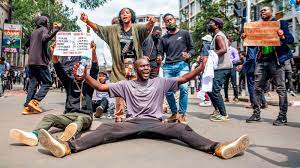Generation Z is made up of people born between 1997 and 2012. It’s the second-highest youth generation in terms of numbers and population composition, and they turn up during elections of any nature, according to the Center for Information and Research on Civic Learning and Engagement at Tufts University and the Uganda Bureau of Statistics.
In the recent riots in Kenya, Generation Z, commonly known as Gen Z, played a role in destabilizing and causing chaos to the government of Kenya and the entire East African community, where Kenya is one of the biggest economies, causing losses to the landlocked neighboring countries such as Uganda and Rwanda.
The same Gen Z, according to President Museveni, was used by foreign forces to attempt to destabilize and cause riots in Uganda under the pretext of the “March 2 Parliament” campaign on July 23, 2024. Fortunately, or unfortunately, Uganda’s security apparatus was in a position to combat their actions.
During the duo riots, the Gen Zs expressed their highest degree of activism by integrating their daily use of social media into a tool. They went on to use encrypted messaging apps such as WhatsApp and virtual private networks (VPN) to mobilize each other covertly without being identified by the authorities.
Besides the Gen Zs prowess in social media activism, they face some impediments that are associated with their generation: their inability to deal with stress compared to the previous generations, double personalities challenges, and their ability to easily quit.
Gen Z also encounters mental health challenges such as anxiety, depression, loneliness, media, and academic pressure.
Despite Gen Zs always turning up for voting in large numbers, research shows that they vote without internalizing the manifestos of the people they vote for; that is to say, they vote out of excitement, ignorance, and a lack of historical understanding. This is one of their biggest weaknesses.
Whereas political ideology is the basis for the sustainable political future development of any society, especially in the developing countries of Africa, political ideologies help individuals understand reality and organize their values and beliefs. It helps to explain why people do what they do and why they do it in uniform without personalizing their efforts.
This ingredient is lacking in today’s Gen Zs, which makes them a time bomb. Most Gen Zs spend most of their free time on social media, watching celebrity and entertainment content, creating content for more followers, and drinking themselves to shame, to mention but a few.
This gets me to question where they can comprehend contemporary politics. What are their levels and capacities of knowledge in politics?
Much as today’s Gen Zs seem to have concentrated more on digital media, it is vulnerable to government censorship and interference. The internet can be slowed down, and some apps can be disrupted, hence disrupting their entire livelihood.
A case is in 2021, when the internet was shut down by the government to stop the operations of those who planned to rig votes and spread falsehoods in the results. Gen Z was so concerned about why the internet was shut down and how they were going to survive that they didn’t realize that the government was curtailing a possible conflict that could have resulted in bloodshed.
On the other hand, the impact of digital activism cannot be underrated since most of their operations are always supported by a certain invisible hand, specifically western powers.
If this generation can be swayed by what looks like friendly forces fighting for their rights and yet, in the actual sense, they are fighting leaders who have kept law and peace in the country, how will they survive in the world of politics?
This got me thinking about whether Gen Z can handle contemporary politics with the way they live and think. It is simply myopic.















